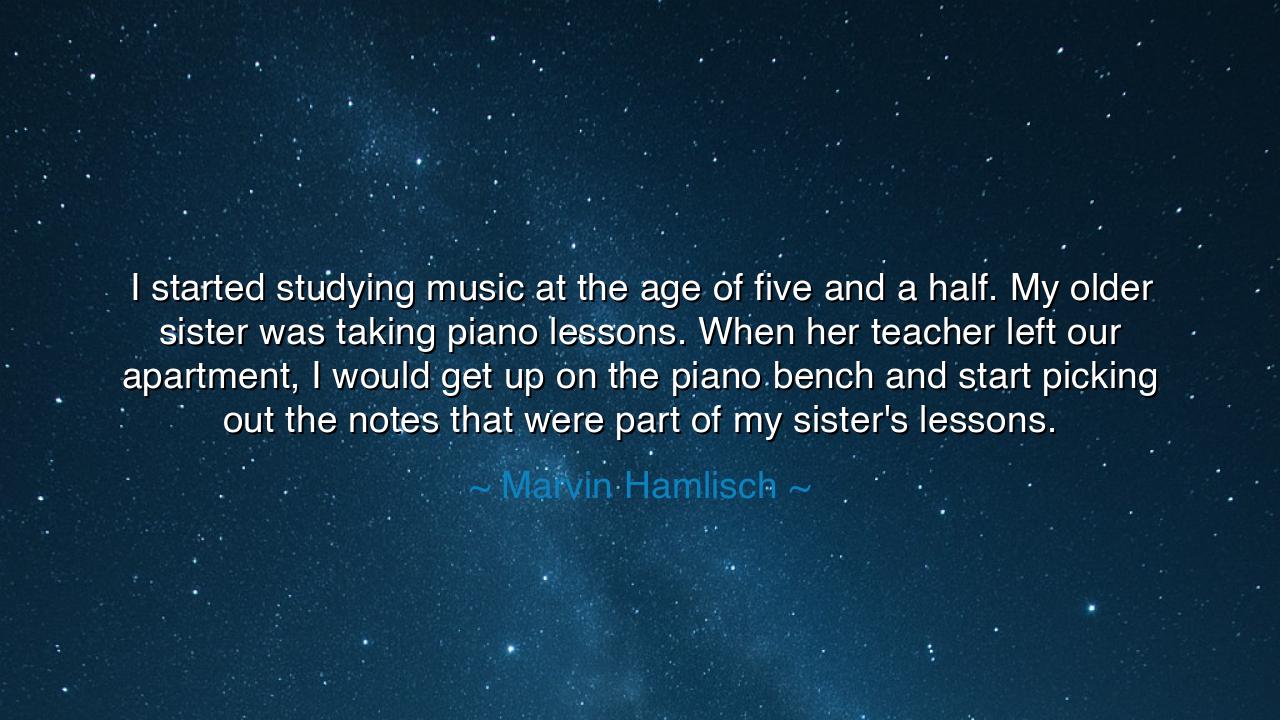
I started studying music at the age of five and a half. My older
I started studying music at the age of five and a half. My older sister was taking piano lessons. When her teacher left our apartment, I would get up on the piano bench and start picking out the notes that were part of my sister's lessons.






In the tender recollection of Marvin Hamlisch, we glimpse the birth of genius: “I started studying music at the age of five and a half. My older sister was taking piano lessons. When her teacher left our apartment, I would get up on the piano bench and start picking out the notes that were part of my sister’s lessons.” These words, though spoken with simplicity, reveal the mystery of how talent awakens—quietly, innocently, almost as if guided by unseen hands. They remind us that greatness often begins not with grand intention, but with small acts of curiosity and imitation.
The image of the child climbing onto the piano bench is deeply evocative. It speaks of a soul so drawn to sound that it could not remain still when the keys were before him. His sister’s lessons were not his own, yet he claimed them with eagerness, as if the music already lived within him, waiting for the chance to emerge. This is the essence of vocation: not something imposed from without, but something already present, revealed through opportunity and desire. Hamlisch’s story tells us that the gifts we carry are often awakened in childhood, in moments so small they might go unnoticed if not remembered.
The presence of the sister and the teacher also reminds us of the role of others in shaping destiny. Though it was not intended for him, her lessons became his lessons. The teacher, without knowing, instructed not only one child but two. In this way, life shows us that influence often spreads beyond its intended target, and that one act of teaching, one moment of sharing, can ripple outward into greatness unseen. The genius of Hamlisch was, in part, born from the simple fact that music was in his home, made accessible by the presence of family and mentors.
History offers us many such examples. The young Wolfgang Amadeus Mozart listened intently as his sister Nannerl practiced the harpsichord, and soon he surpassed her, playing what he had absorbed by ear. Similarly, Michael Faraday, one of the greatest scientists, was a poor boy who read books he had been tasked to bind, and in so doing discovered his calling. Like Hamlisch, they show us that greatness often begins in the margins—when the child seizes what is near at hand, and transforms it into something eternal.
The meaning of Hamlisch’s story, then, is not only about music, but about the power of curiosity and the boldness of imitation. Too often, we dismiss imitation as mere copying. But in truth, imitation is the first step of mastery. The child imitates the parent, the apprentice imitates the master, and in time, their own voice emerges. Hamlisch did not remain a mere echo of his sister’s lessons; by imitating her, he discovered his own sound. And so it is with all learning: imitation leads to transformation, and transformation to originality.
The lesson for us is clear: nurture the sparks of curiosity, especially in the young. When a child reaches for the keys, the brush, the book, or the tools of craft, do not dismiss it as play, for it may be the beginning of destiny. As adults, too, we must remember that it is never too late to climb onto the metaphorical piano bench and begin picking out notes. Curiosity and imitation are not only for children—they are the eternal keys to learning, growth, and mastery.
In practice, this means surrounding ourselves with voices, lessons, and examples worth imitating. If you wish to learn, place yourself near those who know. If you wish to grow, expose yourself to beauty, to discipline, to wisdom, and let your curiosity guide you. And when the spark appears, act upon it—do not wait for perfect conditions, for greatness often begins in the imperfect moment, when the teacher has left and the child dares to play.
Thus, the words of Marvin Hamlisch resound as a parable of beginnings: “When her teacher left, I would get up on the piano bench and start picking out the notes.” Let us take this as a reminder that genius is often born from curiosity, from the willingness to imitate, from the courage to begin. And let us pass this teaching forward: nurture the small sparks, for in them lie the flames that can one day light the world.






AAdministratorAdministrator
Welcome, honored guests. Please leave a comment, we will respond soon